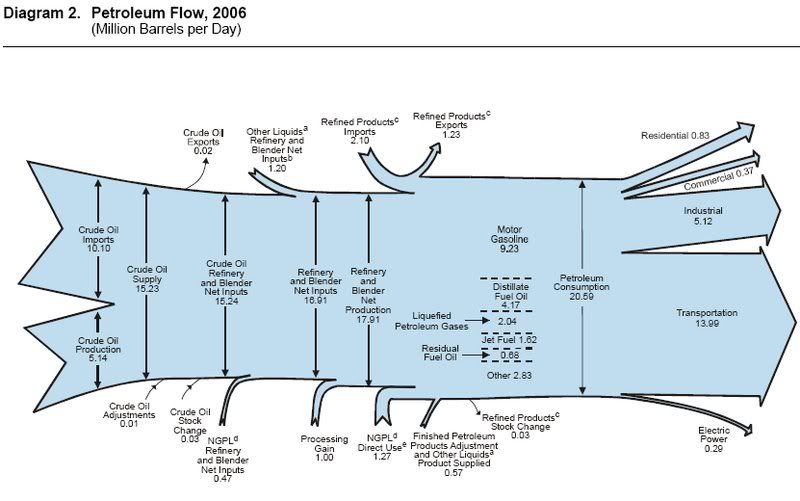A rather key part of the phrase.
Very little oil is used to generate electricity today. Much of what is used is petroleum coke and residual oil. Those are refinery "left-overs" after removing all the higher value products like gasoline and diesel.


Posted on 03/06/2008 12:04:36 AM PST by Recall
Interesting site but here is what really caught my eye there:
(it's close to the bottom of the page)
Oil Conservation
Following the 1973 oil embargo, the U.S. Congress extended Daylight Saving Time to 8 months, rather than the normal six months. During that time, the U.S. Department of Transportation found that observing Daylight Saving Time in March and April saved the equivalent in energy of 10,000 barrels of oil each day - a total of 600,000 barrels in each of those two years. Likewise, in 1986, Daylight Saving Time moved from the last Sunday in April to the first Sunday in April. No change was made to the ending date of the last Sunday in October. Adding the entire month of April to Daylight Saving Time is estimated to save the U.S. about 300,000 barrels of oil each year.
(Excerpt) Read more at webexhibits.org ...
bump
It saves oil because people with greasy hair aren’t in bed as much and therefore aren’t leaving it on their pillow. Jerry Lewis’s shiny locks fuels 16 cars alone.
Repealing no-fault divorce laws would save much more oil. Two can live cheaper than one.
And with less daylight the earth doesn’t get as warm.
lol
Hope the cows got the memo.
Not so fast!
http://venturacountystar.com/news/2008/mar/06/study-discounts-one-belief-about-daylight-saving/
As air conditioning has become almost standard in houses — even in the North — I wonder if that still holds true.
And yet our borders stay open and we are chastised and forced to pay extra for increasing oil demand that the citizens didn't create.
I looked at your link, but it only mentions Indiana.
Is there something about Indiana's geographical position in their Time Zone that nullifies DST's advantages?
An early goal of DST was to reduce evening usage of incandescent lighting, formerly a primary use of electricity.[6] Although energy conservation remains an important goal,[24] studies are contradictory, and suggest that DST can increase energy use in some common cases:
* The U.S. Dept. of Transportation (DOT) concluded in 1975 that DST might reduce the country’s electricity usage by 1% during March and April,[25] but the National Bureau of Standards (NBS) reviewed the DOT study in 1976 and found no significant energy savings.[21]
* In 2000 when parts of Australia began DST in late winter, overall electricity consumption did not decrease, but the morning peak load and prices increased.[26]
* Although a 2007 study estimated that introducing DST to Japan would reduce household lighting energy consumption,[27] a 2007 simulation estimated that DST would increase overall energy use in Osaka residences by 0.13%, with a 0.02% decrease due to less lighting more than outweighed by a 0.15% increase due to extra cooling; neither study examined non-residential energy use.[28]
* A 2007 California study found no clear evidence that electricity would be saved through the earlier start to DST that year,[29] and although one utility did report a decrease in March 2007, five others did not.[30]
* DST may increase gasoline consumption: U.S. gasoline demand grew an extra 1% during the newly introduced DST in March 2007.[31]
* A 2007 study estimated that winter daylight saving would prevent a 2% increase in average daily electricity consumption in Great Britain.[32]
* A 2008 study examined electricity billing data in Indiana before and after it adopted DST in 2006, and concluded that DST increased electricity consumption by 1% to 4%.
>> Wikipedia
I don’t believe it. What DST saves at night it uses in the morning. It’s nothing but a nuisance.
A rather key part of the phrase.
Very little oil is used to generate electricity today. Much of what is used is petroleum coke and residual oil. Those are refinery "left-overs" after removing all the higher value products like gasoline and diesel.


Basically, we should get rid of daylight savings time. Perhaps, if they choose, organizations and institutions can simply start their workday an hour earlier so folks can get home during daylight hours. I suspect that the “savings” are based on questionable assumptions, data, and methodology. DST serves no useful purpose IMO, because the pluses and minuses cancel one another out in the big picture.
DST is a Communist plot to weaken our minds and souls.
So if we save 600,000 barrels a year by turning the clocks back one hour, we should save 1.2 Million barrels by turning the clocks back two hours. What if we turned the clocks back 24 hours? We wouldn’t need to use any energy today because we already used it yesterday. We wouldn’t need to go to work because we did today’s work yesterday.
Come Sunday, my dog will still know when it is 9 PM (to do his business) and he doesn’t even have a clock in his room.
You burst my bubble.
Perhaps, but the question the post - and the Website - fail to answer is HOW.
Disclaimer: Opinions posted on Free Republic are those of the individual posters and do not necessarily represent the opinion of Free Republic or its management. All materials posted herein are protected by copyright law and the exemption for fair use of copyrighted works.